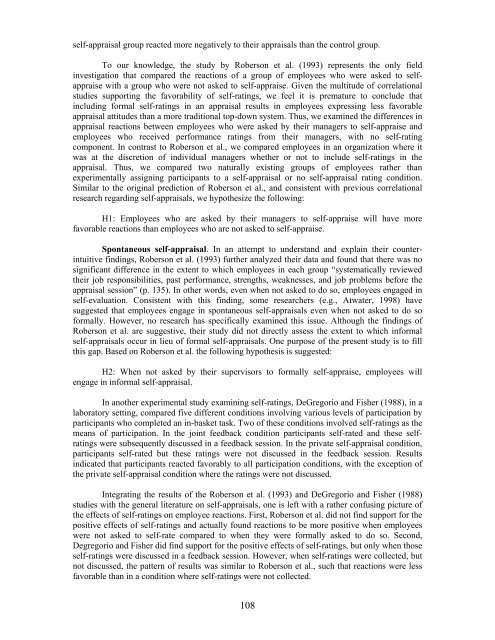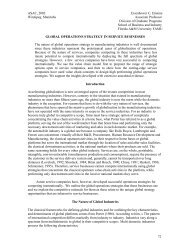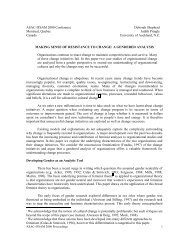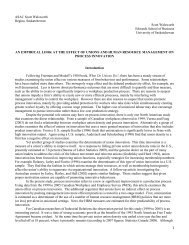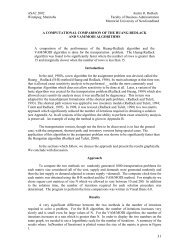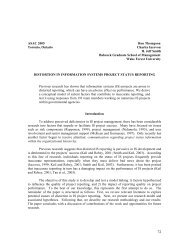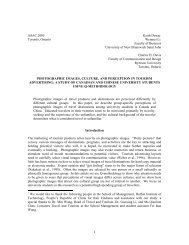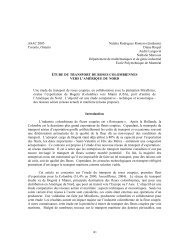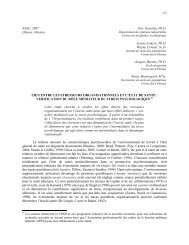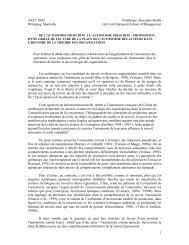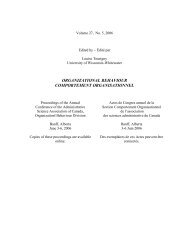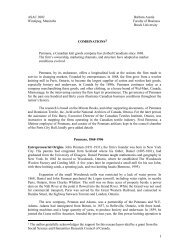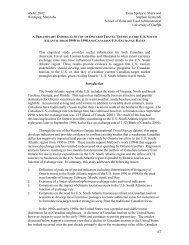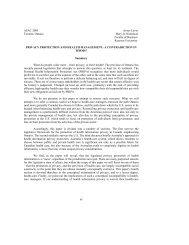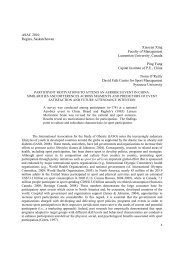self-appraisal group reacted more negatively to their appraisals than the control group.To our knowledge, the study by Roberson et al. (1993) represents the only fieldinvestigation that compared the reactions of a group of employees who were asked to selfappraisewith a group who were not asked to self-appraise. Given the multitude of correlationalstudies supporting the favorability of self-ratings, we feel it is premature to conclude thatincluding formal self-ratings in an appraisal results in employees expressing less favorableappraisal attitudes than a more traditional top-down system. Thus, we examined the differences inappraisal reactions between employees who were asked by their managers to self-appraise andemployees who received performance ratings from their managers, with no self-ratingcomponent. In contrast to Roberson et al., we compared employees in an organization where itwas at the discretion of individual managers whether or not to include self-ratings in theappraisal. Thus, we compared two naturally existing groups of employees rather thanexperimentally assigning participants to a self-appraisal or no self-appraisal rating condition.Similar to the original prediction of Roberson et al., and consistent with previous correlationalresearch regarding self-appraisals, we hypothesize the following:H1: Employees who are asked by their managers to self-appraise will have morefavorable reactions than employees who are not asked to self-appraise.Spontaneous self-appraisal. In an attempt to understand and explain their counterintuitivefindings, Roberson et al. (1993) further analyzed their data and found that there was nosignificant difference in the extent to which employees in each group “systematically reviewedtheir job responsibilities, past performance, strengths, weaknesses, and job problems before theappraisal session” (p. 135). In other words, even when not asked to do so, employees engaged inself-evaluation. Consistent with this finding, some researchers (e.g., Atwater, 1998) havesuggested that employees engage in spontaneous self-appraisals even when not asked to do soformally. However, no research has specifically examined this issue. Although the findings ofRoberson et al. are suggestive, their study did not directly assess the extent to which informalself-appraisals occur in lieu of formal self-appraisals. One purpose of the present study is to fillthis gap. Based on Roberson et al. the following hypothesis is suggested:H2: When not asked by their supervisors to formally self-appraise, employees willengage in informal self-appraisal.In another experimental study examining self-ratings, DeGregorio and Fisher (1988), in alaboratory setting, compared five different conditions involving various levels of participation byparticipants who completed an in-basket task. Two of these conditions involved self-ratings as themeans of participation. In the joint feedback condition participants self-rated and these selfratingswere subsequently discussed in a feedback session. In the private self-appraisal condition,participants self-rated but these ratings were not discussed in the feedback session. Resultsindicated that participants reacted favorably to all participation conditions, with the exception ofthe private self-appraisal condition where the ratings were not discussed.Integrating the results of the Roberson et al. (1993) and DeGregorio and Fisher (1988)studies with the general literature on self-appraisals, one is left with a rather confusing picture ofthe effects of self-ratings on employee reactions. First, Roberson et al. did not find support for thepositive effects of self-ratings and actually found reactions to be more positive when employeeswere not asked to self-rate compared to when they were formally asked to do so. Second,Degregorio and Fisher did find support for the positive effects of self-ratings, but only when thoseself-ratings were discussed in a feedback session. However, when self-ratings were collected, butnot discussed, the pattern of results was similar to Roberson et al., such that reactions were lessfavorable than in a condition where self-ratings were not collected.108
Interestingly, when trying to elucidate their findings, both Roberson et al. (1993) andDegregorio and Fisher (1988) suggested that perhaps the act of asking employees for self-ratingssets up the expectation that these self-ratings will be considered in the appraisal. They furtherspeculated that it was possible that, in their studies, these expectations were not met, resulting inunfavorable reactions. Similar to this explanation, we feel that the key to reconciling andexpanding upon the extant self-appraisal literature is employee expectations, a topic to which weturn next.Self-Appraisal ExpectationsWithin the self-ratings literature, as well as the overall performance appraisal reactionsliterature, attention has been primarily focused on the assessment of reactions, and then trying tointerpret these reactions by making inferences regarding the antecedents of the reactions. This issimilar to the past approach taken by many justice researchers, as noted by Cropanzano andPrehar (2001). Recently, however, some researchers in the justice field are taking a moreproactive approach to the assessment of justice. For example, Shapiro and her colleagues (e.g.,Shapiro & Kirkman, 2001) have begun to explore the role of expectations on justice perceptions.They suggest that in order to adequately understand individuals’ reactions to an event, one mustfirst delineate the expectations of those individuals regarding the event. In a preliminary study inthis area, Shapiro and Kirkman found that individuals who reported that they had expected anorganizational change event to have a positive effect actually expressed positive reactionssubsequent to the event. Similarly, those who expected the same change to be negative tended toexperience it negatively. The authors explained this phenomenon in terms of a self-fulfillingprophesy, such that those who expect injustice in a particular situation, tend to perceive injustice,and those who expect justice, tend to perceive justice.The present study attempts to extend this line of reasoning to the area of performanceappraisal reactions in the specific context of self-ratings. We contend that employees’expectations regarding the extent to which they believe their managers will consider their selfratingswhen making their evaluations will significantly affect their reactions toward theappraisal. More specifically, in line with the work of Shapiro and her colleagues, we expect thatthe reactions employees express subsequent to their appraisals should correspond to theexpectations they have regarding the use of their self-ratings. Based on this, the followinghypothesis is offered:H3: For those employees who are asked to self-appraise, there will be a positiverelationship between the expectation that one’s manager will consider one’s self-ratings andappraisal reactions.We feel that measuring employee expectations is an important step in the study of selfratings.That is, although we predict that asking employees to engage in self-ratings as part of theappraisal process will lead to positive appraisal reactions, we expect that there will still bevariability in employees’ responses. Self-rating expectations are a means of explaining some ofthis variability and thus, refining our understanding of the effects of self-ratings. However, inorder to better understand the effects of self-ratings, it is important to also consider whyexpectations should influence appraisal reactions. We suggest that expectations are an importantpredictor of reactions because they influence the extent to which employees feel that their voicewill be heard by their managers, thus providing them with the perception of control in theirappraisal.Expectations and voice. Research in the organizational justice literature has shown thatorganizational voice can lead to perceptions of procedural justice (Folger & Greenberg, 1985) aswell as positive reactions such as satisfaction and perceptions of fairness (e.g., Cawley et al.,1998; Kanfer, Sawyer, Earley, & Lind, 1987; Tyler, 1987). Two alternative interpretations of the109
- Page 1 and 2:
Volume 24, No. 5, 2003Edited by/Éd
- Page 4 and 5:
Pursey HeugensGreg IrvingRoderick I
- Page 6 and 7:
TABLE OF CONTENTS - TABLE DES MATI
- Page 8 and 9:
study of power displays in mixed-ge
- Page 10 and 11:
on expectations and behaviour (Berg
- Page 12 and 13:
TaskThis study required the use of
- Page 14 and 15:
Task-Gender (male-stereotyped or fe
- Page 16 and 17:
It is important to understand the s
- Page 18 and 19:
Crown, C.L. & Cummins, D.A. (1998).
- Page 20 and 21:
Smith-Lovin, L., & Brody, C. (1989)
- Page 22 and 23:
Table 2Summary of Descriptive Stati
- Page 24 and 25:
Table 4Summary of Interaction of Ge
- Page 26 and 27:
ASAC 2003Halifax, Nova ScotiaIain L
- Page 28 and 29:
the interrelationships among the MB
- Page 30 and 31:
studies (Friedman and Sarros, 1989;
- Page 32 and 33:
This study demonstrated that emotio
- Page 34 and 35:
Anxiety, Stress and Coping, in pres
- Page 36 and 37:
Washington, DC: Taylor and Francis,
- Page 38 and 39:
Table 2Overall Goodness-of-Fit Indi
- Page 40 and 41:
ζ 3Depersonalizationη 3β 3,1 (+)
- Page 42 and 43:
ASAC 2003Halifax, Nova ScotiaWendy
- Page 44 and 45:
views independently, gave rise to S
- Page 46 and 47:
track assistant, associate, and ful
- Page 48 and 49:
ole conflict are positively related
- Page 50 and 51:
Table 3. Regression of climate and
- Page 52 and 53:
interests.We speculate the null eff
- Page 54 and 55:
DOOP and short for DOOP scales,”
- Page 56 and 57:
Pelled, L. H., “Demographic diver
- Page 58 and 59:
esulting increase in discretion ove
- Page 60 and 61:
al., 1995). However, the distinctio
- Page 62 and 63:
ise to strong pressures for conform
- Page 64 and 65: presented with a complete list of a
- Page 66 and 67: Table 3QAP Regression Coefficients
- Page 68 and 69: ConclusionResearchers of social inf
- Page 70 and 71: suggestions for further research.
- Page 72 and 73: performing on the job.” Presumabl
- Page 74 and 75: positively related to performance i
- Page 76 and 77: proposed hypotheses were supported.
- Page 78 and 79: ConclusionThis research has made se
- Page 80 and 81: Be more enthusiastic and exert extr
- Page 82 and 83: Table 2Correlations Among the Laten
- Page 84 and 85: performance expectations on feedbac
- Page 86 and 87: changements qui s’opèrent dans l
- Page 88 and 89: structures, politiques, systèmes,
- Page 90 and 91: comportements liés à la communica
- Page 92 and 93: Tableau 2Échelles de mesure de la
- Page 94 and 95: prédiction des compétences clés
- Page 96 and 97: organisation n’est pas uniforme e
- Page 98 and 99: complètement ce construit. Ces cha
- Page 100 and 101: Wagner, R.K. and Sternberg, R.J. (1
- Page 102 and 103: What is a toxin handler?In two arti
- Page 104 and 105: potentially limited scope and conte
- Page 106 and 107: work role demands. In this survey,
- Page 108 and 109: The three factors in this rotated f
- Page 110 and 111: and service orientation, the abilit
- Page 112 and 113: ASAC 2003Halifax, Nova ScotiaLisa M
- Page 116 and 117: effect of voice are the value-expre
- Page 118 and 119: “Strongly Disagree” to “Stron
- Page 120 and 121: esults suggest that incorporating s
- Page 122 and 123: Personality and Social Psychology,
- Page 124 and 125: Table 1Means, Standard Deviations,
- Page 126 and 127: Table 3Test of the Mediating Role o
- Page 128 and 129: ASAC 2003Halifax, Nova ScotiaAnn Fr
- Page 130 and 131: individual level, polychronicity is
- Page 132 and 133: construct.Drawing on computer-media
- Page 134 and 135: Consequence: Impact on Work Overloa
- Page 136 and 137: Conversation complexity may also mo
- Page 138: Implications for practiceFuture res
- Page 141 and 142: ReferencesAncona, D.G., Goodman, P.
- Page 143 and 144: no. 3 (1994): 381-391.Macan, T.H.,
- Page 145 and 146: ASAC 2003Halifax, Nova ScotiaIan R.
- Page 147 and 148: Assessing Measures: Affective Commi
- Page 149 and 150: implications of psychological contr
- Page 151 and 152: commitment, affective commitment, c
- Page 153 and 154: Motivational Process Variables. Amo
- Page 155 and 156: DiscussionThe main purpose of this
- Page 157 and 158: approaches zero. In the present stu
- Page 159 and 160: Extension and test of a three-compo
- Page 162 and 163: Table 1Descriptive Statistics and Z
- Page 164 and 165:
Table 3Standardized Factor Loadings
- Page 166 and 167:
Table 5Hierarchical Regression Anal
- Page 168 and 169:
ASAC 2003Halifax, Nova ScotiaJoan F
- Page 170 and 171:
ASAC 2003Halifax, Nova ScotiaArla D
- Page 172 and 173:
ASAC 2003Halifax, Nova ScotiaIvy Ky
- Page 174:
ASAC 2003Halifax, Nova ScotiaNina D


